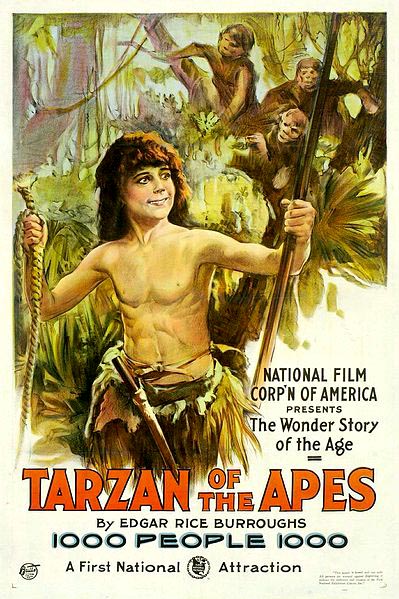 |
| Poster for a 1918 film version of Tarzan of the Apes (Wikipedia) |
Note: Prolific American "pulp" author Edgar Rice Burroughs wrote almost 80 novels, 24 of them about "Tarzan." Let's see the first one!
Get Ready: Did you ever swing on a rope or chain and do a "Tarzan yell"? (It's fun!) If you don't know what I mean, watch an old Tarzan movie!
Edgar Rice Burroughs was a master of the genre known as "pulp fiction," and no better example can be found than his "Tarzan of the Apes," the first of two dozen or so escapist novels to feature that now well-known protagonist.
The story begins in 1888 when a noble English couple, John Clayton, Viscount Greystoke, and his wife Alice (Lady Greystoke) have been stranded by a mutinous crew in the jungles of western equatorial Africa. While there, Alice gives birth to a baby boy, who seems to have been named John Clayton II. Sadly, she dies on the child's first birthday, and the father is killed soon after by an ape.
The boy is orphaned--but not for long. After John's death the local band of apes returns and one of them, Kala, who had recently lost her own child, takes up the human child as her own.
The apes call the boy in their own (fictional) language "Tarzan," meaning "White Skin." He grows up unaware that he is not an ape himself, until, that is, he and an ape "cousin" both lean over to drink from a pool at the same time, and he beholds the difference in their faces. He is appalled.
Some time later, he discovers the cabin--built by his father--in which he had been born, and in it all the Claytons' earthly goods. He finds some reading primers and, in one of the book's least likely inventions, teaches himself to read, though he cannot know how the words are pronounced. He later finds his father's diary, but the elder Clayton wrote it in French (an aristocratic conceit) and the uneducated ape-man cannot read it.
This phase of his life is marked by challenges from larger, older apes, whom he manages to outwit or sometimes kill with the aid of his fatehr's knife. (Apes cannot use tools.) His skill at hunting causes Kerchak, the band's leader, to grow jealous and at last attack him. Tarzan kills him and becomes "king" of the apes.
There is further trouble, though, with a band of black Africans, one of whom kills Tarzan's "adopted" mother. This creates enmity between the "white ape" and the tribe, and so he raids them and plays pranks on them. They, in turn, think he is an evil spirit and attempt to appease him with offerings.
When the feral teen reaches 21, another party of Euro-Americans is marooned on the coast. In it is a 19-year-old American girl, Jane Porter. She is the first non-native woman the boy has ever seen. Also in the party is Tarzan's human cousin, William Cecil Clayton, who, not knowing he is still alive, has inherited Tarzan's estate in England. On several occasions, the denizen of the jungle assists the party, and saves Jane, but without revealing himself.
At one point he is saving a Frenchman named Paul D'Arnot from the natives, and meanwhile a rescue ship appears and takes away the rest of the party. Tarzan learns French from D'Arnot, who takes him out of Africa and teaches him "civilized" ways.
At last Tarzan travels to the American state of Wisconsin, USA, where he discovers that Jane is engaged to his cousin, the one who has also taken his estate. Rather than assert his privilege as Lord Greystoke, he keeps his identity hidden to allow Jane her happiness.
--------Read more: https://en.wikipedia.org/wiki/Tarzan_of_the_Apes
Practice: Match the term to its definition below:
- appalled
- conceit
- denizen
- escapist
- feature
- inventions
- orphaned
- outwit
- primers
- privilege
- books that teach one how to read
- horrified; shocked
- made-up things
- be smarter than
- an affectation; an attempt to look fancy
- a resident
- avoiding reality through fantasy
- social advantage
- give a prominent place to
- left without parents
Answers are in the first comment below.
Submitted to the Shenzhen Daily for September 6, 2021


Answers to the Practice: 1. b; 2. e; 3. f; 4. g; 5. i; 6. c; 7. j; 8. d; 9. a; 10. h
ReplyDelete